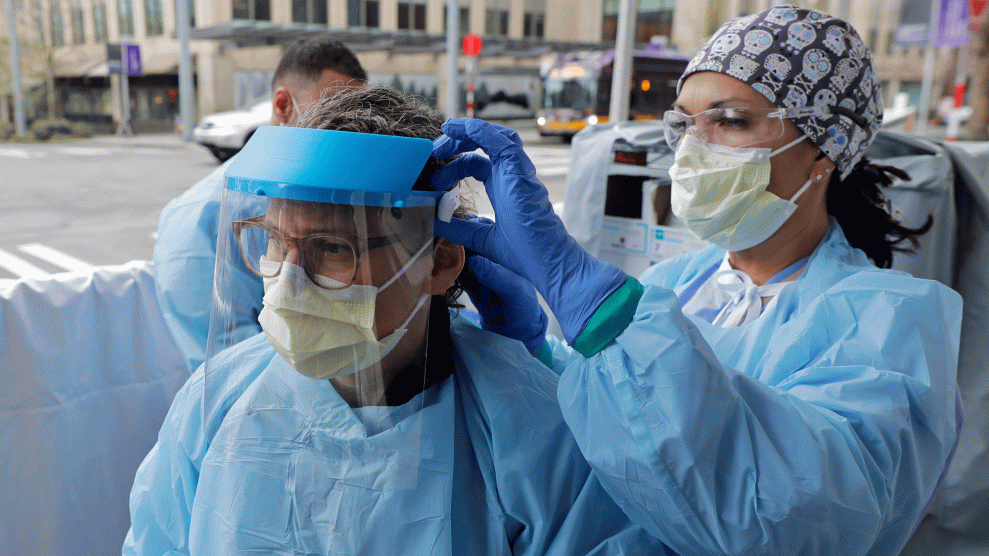
Ted S. Warren/AP
On Friday morning, doctors, nurses, and other employees of Partners HealthCare, the largest health care system in Massachusetts, received an email from the company informing them they would not be receiving hazard or crisis pay for dealing with coronavirus cases. The letter was signed by the CEO, who makes at least $2 million a year and perhaps up to $6 million.
Dr. Anne Klibanski, the president and chief executive officer of Partners HealthCare, opened her “Dear Colleagues” note, which was obtained by Mother Jones, with an expression of “gratitude to all of you for providing exceptional patient care and for supporting each other and the community during these unprecedented times.” Klibanski said she and the company’s leadership team appreciated the “sacrifices each of you has made to ensure that care can be delivered when and where it’s needed.”
But next she gave her employees the bad news. Noting that some Partners workers have requested hazard pay, she wrote, “We understand why you may be worried about exposure and are vigilant in our efforts to help you and your colleagues stay safe and healthy. We have also heard you are worried about your family, friends, colleagues and patients.” But, she declared, “we do not calibrate pay and benefits based upon the patients’ condition and for this reason we do not offer hazard or crisis pay.”
In other words, do your job during this crisis and don’t expect more pay.
Doctors, nurses, and other health care workers across the United States have been called on to put in extra hours and to face enormous risks during the coronavirus crisis. A primary care physician who works at one of Partners HealthCare’s hospitals and who asks not to be identified says that although he is a half-time employee, he has had to work around the clock. But his pay remains the same: in the $90,000 range. There is no overtime compensation. Nurses, he adds, have been pressured to work within the COVID-19 clinic. He says he knows of one nurse with lupus who was hesitant to report to the clinic but was told that doing so was a condition of her employment. Doctors and nurses, he points out, have been raising with supervisors the issue of hazard pay. “Why are we not getting hazard pay?” this doctor asks. “We’re risking our lives. Partners says it doesn’t have the money to do that. But it has some rich hospitals, even if it is losing money now because it cannot bill for office visits and the big elective money-makers: colonoscopies, endoscopies, plastic surgery.”
In her letter, Klibanski pointed out that Partners HealthCare, which was founded by Massachusetts General Hospital and Brigham and Women’s Hospital, does provide its employees with pay and benefits if they cannot work because they have contracted COVID-19 and that the company is providing eight weeks of pay and benefits to employees who are not needed because elective surgeries and other non-urgent procedures have been canceled or deferred. But these measures do not benefit those doctors, nurses, and other hospital workers who are treating coronavirus cases during this hellish pandemic. A week ago, CNN reported that 150 employees at Boston hospitals had tested positive for the coronavirus, with 86 of these cases in Massachusetts General and Brigham and Women’s Hospital.
Klibanski doesn’t have to worry about hazard pay herself. When she became head of the company last year, it was reported that her base annual salary would be $2 million. But it’s likely she pockets more than that. Her predecessor received a base salary of $2.3 million in 2017 plus additional compensation of $3.8 million. According to the Boston Business Journal, that year he earned “nearly three times as much as every other health system executive in the state.”
The letter to the Partners HealthCare employees was signed by the heads of 12 hospitals that are part of the company, including Dr. Peter Slavin, president of of Massachusetts General, and Dr. Elizabeth Nabel, president of Brigham and Women’s Hospital. They each earned $2.6 million in total compensation in 2017.
A spokesperson for Partners HealthCare did not respond to a request for comment.
The idea of providing extra pay to health care workers on the front lines of the coronavirus crisis has even been broached by President Trump. Earlier this week, he said his administration was exploring whether to provide hazard pay for doctors, nurses, and other health care workers, noting he was considering including additional pay for these workers in another coronavirus relief package. “We are looking at different ways of doing it, primarily through the hospitals,” Trump said on Fox News. He added, “If anybody’s entitled to it, they are.”
Meanwhile, some hospitals in Massachusetts and elsewhere are furloughing health care workers and reducing their pay in response to the postponement of non-coronavirus procedures. Intermountain Healthcare, the largest healthcare provider in Utah and surrounding areas, has announced that about 600 employees may receive pay cuts due to shifting demands for medical care. The company noted that its executives would not receive their usual annual raises. This week, a Partners HealthCare spokesperson said the company was not planning any furloughs “at this present time.”
The primary care doctor who works for Partners HealthCare notes that the leaders of the company “should be taking a huge pay cut right now. No one should be making millions of dollars when doctors and nurses are struggling. They should put that money in a fund for more pay and protective equipment to save our lives.”
In the letter rejecting the idea of hazard or crisis pay, Klibanski, Slavin, Nabel, and the others wrote: “Thank you for the courage you demonstrate every day and for the continued dedication to our patients, employees and community.”








